Beat tired and achy legs with the best compression socks for varicose veins. This condition can affect individuals for all sorts of reasons. When the valves in a fatigued vein do not close fully, blood pools in places, resulting in bulging veins. Compression socks put pressure on the veins to help push the blood back up to the heart, reducing aching, heaviness and swelling in the legs.
Someone standing on their feet all day may benefit from wearing compression socks. They help reduce the heaviness, aching and leg fatigue. Equally, varicose veins can occur in a person that sits for long periods. Notably, compression socks are a preventative measure against blood clots (deep vein thrombosis) during long flights. The best remedy is prevention; try to raise your heart rate every day to get the circulation going. If you're doing intense exercise, such as running, wearing compression socks can help speed up muscle recovery. They can lessen micro-injuries that cause swelling during intense exercise.
Best compression socks for varicose veins at a glance
Dr. Johannes Uys, Doctor at Broadgate GP says there are benefits to wearing compression socks or stockings: "They also mitigate the risk of fluid accumulation, relieving symptoms of discomfort and fatigue. You can determine the appropriate compression level for you by seeking tailored advice from a recognised healthcare professional.
"I suggest using compression stockings from well-known brands, such as Sigvaris, Jobst and Juzo, to address any issues associated with varicose veins or oedema. These brands are renowned for their quality and efficacy in boosting circulation and diminishing signs of swelling."
Best compression socks for varicose veins
Best semi-transparent compression stockings
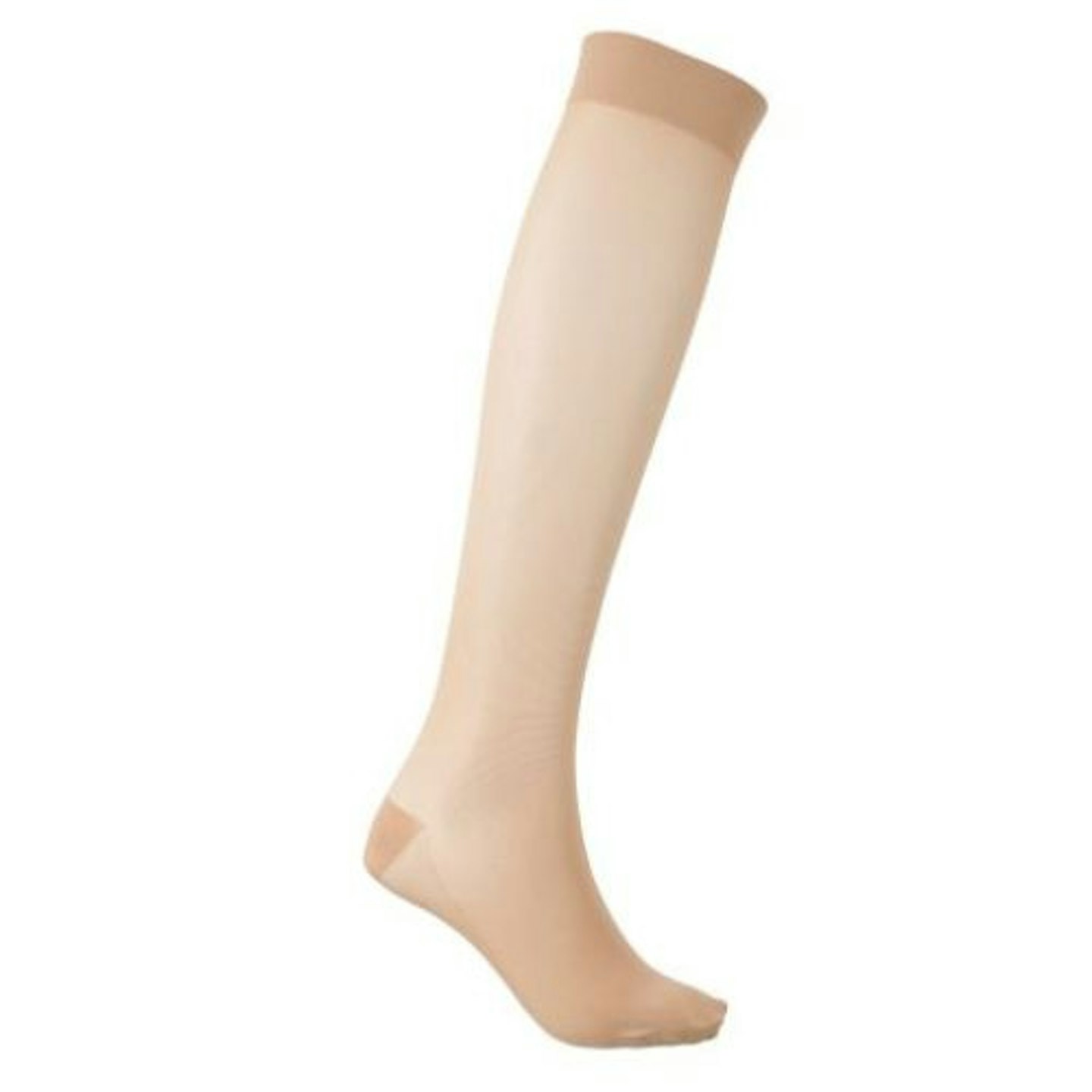 Sigvaris
Sigvariswww.daylong.co.uk
The brand Sigvaris is recommended by Dr. Uys at Broadgate GP. These Sigvaris Essential Semi-Transparent Compression Stockings are available in a range of sizes, fittings and styles. They apply moderate Class 2 15-20mmHg compression that can be effective in relieving aching varicose veins, swollen legs during pregnancy and preventing DVT during long distance flights.
Because they are sheer, they look like tights so they can be worn with a dress. Customers like the fact they don't look like the usual support stockings. Reviews also praise the stockings for being comfortable. Make use of the sizing chart to ensure you get the right size. Sigvaris have a very good range of sizes, including wide fit.
Pros
- Recommended by a GP
- Easy-to-follow sizing chart, plus
- They don't look like medical support socks
Cons
- A customer comments that they kept rolling down
Best compression socks for general use
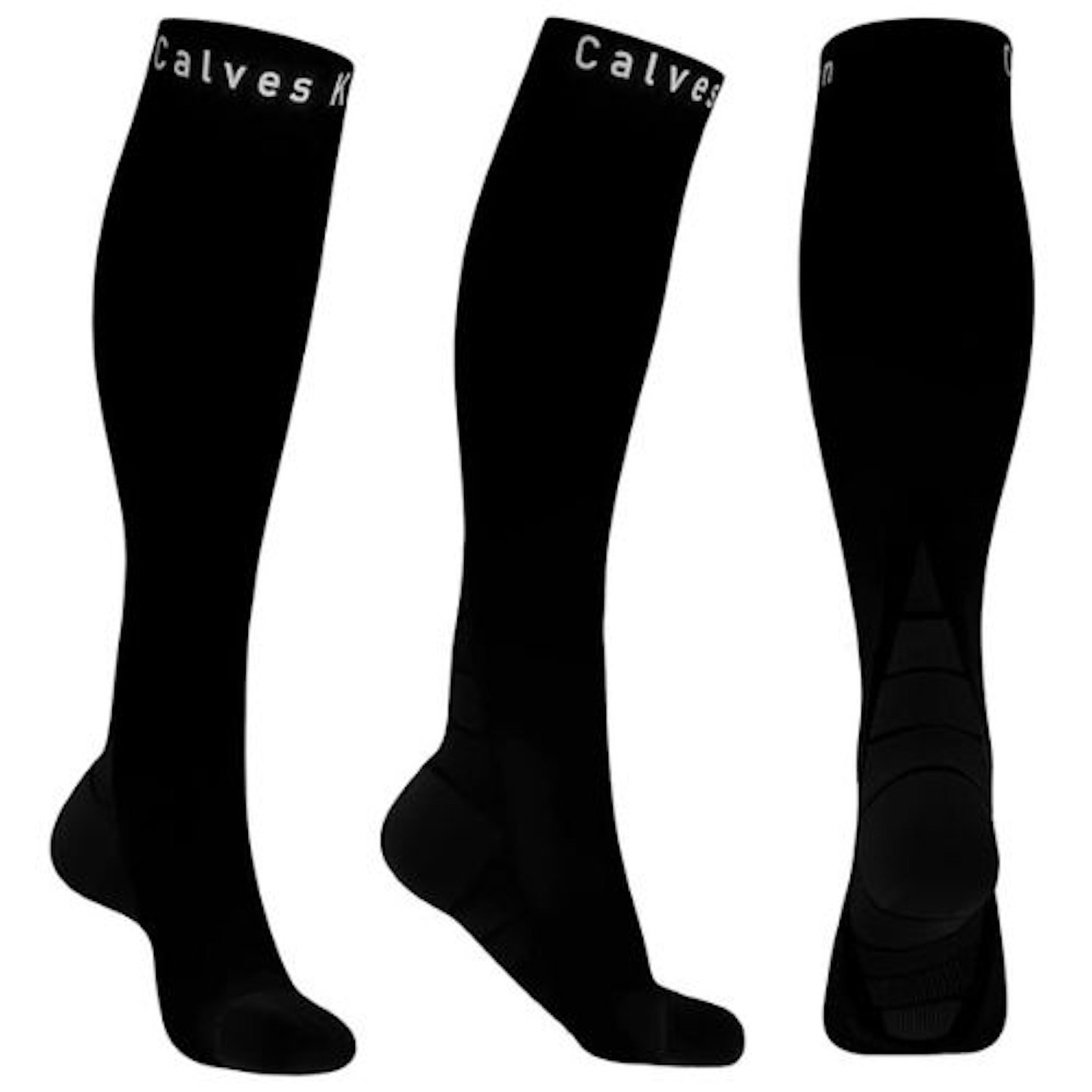 Calves Kelson
Calves KelsonThese Calves Kelson Compression Socks are a good all round option for general wear to reduce leg fatigue. As an example, nurses, long distance lorry drivers and office workers can benefit from wearing compression socks. With 20-30mmHg support, these socks are also effective from reducing leg ache and strain during sports. They are suitable for wearing on flights to reduce the risk of DVT. The socks have a great deal of elasticity, plus the material is breathable and comfortable. It's essential to get the right size, so measure the diameter of your calf and use this measurement as a guide when buying.
This is an Amazon's Choice recommended brand with some extremely positive reviews about the effectiveness of these compression socks. Customers praise the value for money, having tried lots of other brands. If they're fitting correctly, they will feel tight. Customers said it took a day or two to get used to this sensation, however they were pleased that the pain – caused by varicose veins or being on their feet for long shifts – was relieved.
However, there are some opposing reviews mainly focused on the sizing guide. Some found that the socks were either too big or too tight. As with buying shoes, it's worth arranging a fitting at a pharmacy or specialist podiatrist if you are using compression socks for medical reasons.
Pros
- Available in a range of colours and two sizes
- Glowing reviews from customers for whom these socks worked wonders
- Elasticated and breathable material for comfort
Cons
- Opposing views from customers who found the socks didn't fit correctly
Best open toe compression socks
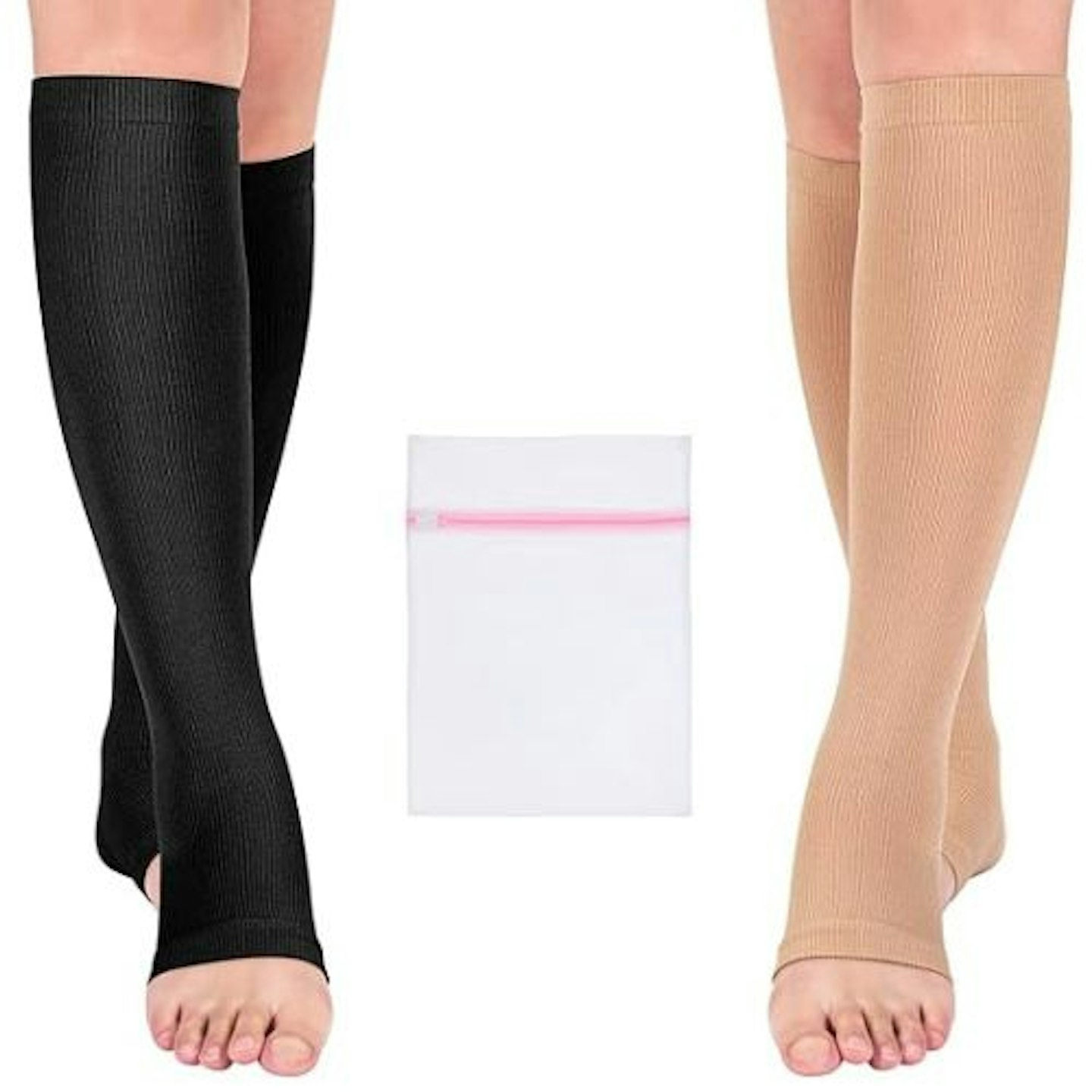 BisLinks
BisLinksBisLinks Open Toe Medical Compression Socks apply firm support to your calves, reducing leg cramps and pain caused by swollen ankles. In addition, they can be worn to provide support post-surgery and reduce varicose veins and spider veins. They are an comfort aid during pregnancy and minimise DVT on flights. The open-toe design makes them even more lightweight and breathable than other compression socks.
Customers praise these compression socks for being a thicker material that provides firm support. They've been effective in alleviating the pain of swollen ankles and more. The only thing to watch out for is that some reviews comment on them coming up a bit short in length.
Pros
- Firm and supportive material that also allows legs to breathe
- Effective in reducing leg pain
- Use for a variety of leg complaints
Cons
- The length comes up a bit short on some people
Best compression socks for ergonomic fit
 aZengear
aZengearaZengear Compression Socks are widely used as flight socks. The ergonomic and graduated compression improves circulation. They can also be used in sports to aid muscle recovery, plus as an aid to improving the symptoms of oedema and varicose veins. The socks are double-stitched and have a seamless toe for comfort. The support is 20-30mmHg which is effective for relieving certain medical conditions.
Customers praise these compression socks for providing relief from chronic leg pain. Also, the socks fit well albeit can feel a bit hot in warm weather. Also, do note that the socks are made from nylon, polyester and elastane. For medical conditions where the skin is broken or irritated wear socks that are made of cotton.
Pros
- Available in a range of colourways and sizes
- Widely used a anti-DVT flight socks
- Ergonomic and graduated compression improves circulation and muscle recovery
Cons
- A review comments that they are thick and could a bit too hot to wear in summer
Best compression socks for comfort
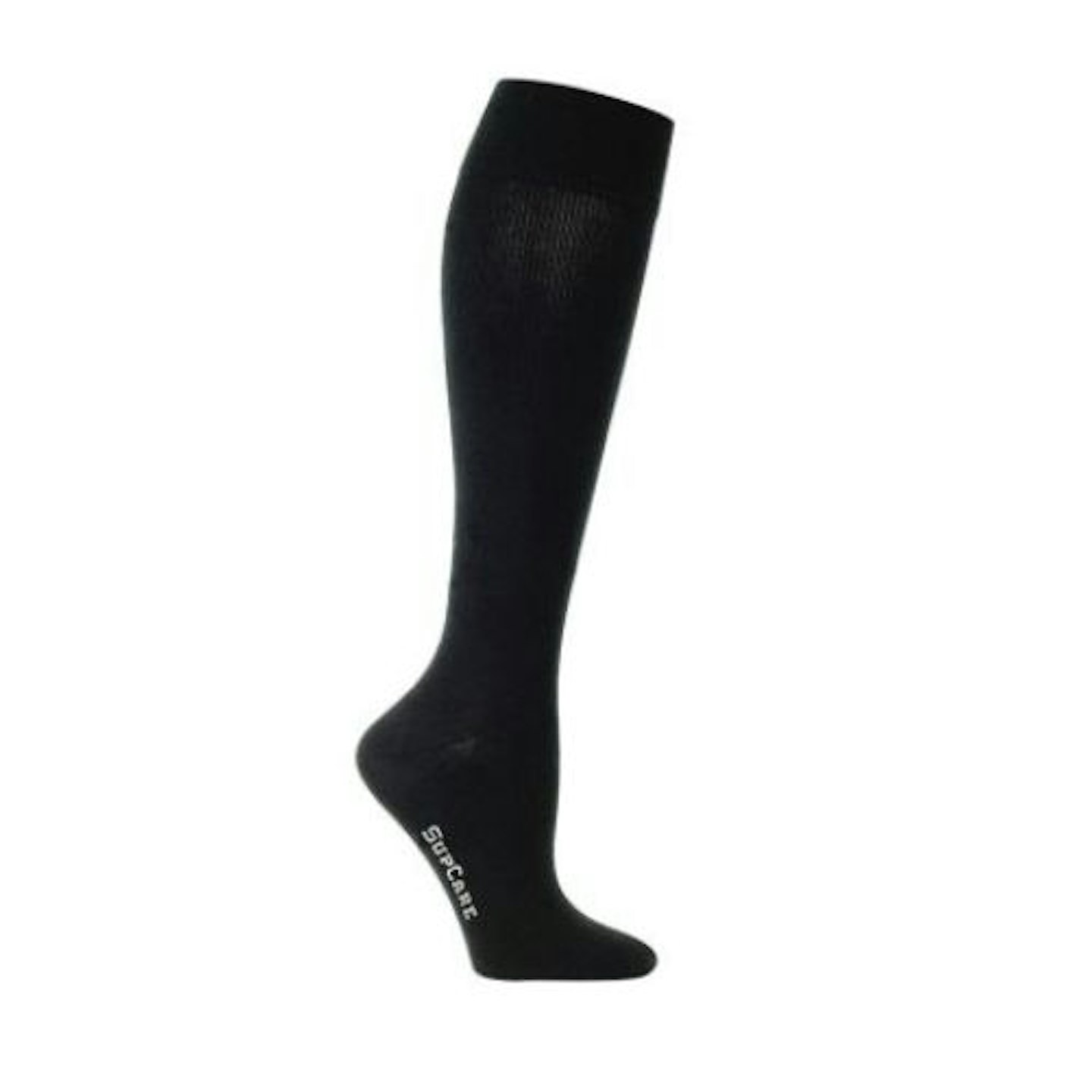 Daylong
Daylongwww.daylong.co.uk
Help combat tired and aching legs, varicose and spider veins, and poor circulation with Daylong SupCare Unisex Support Socks with Bamboo Fibres. These socks offer 15-21mmHg support which is graded as 'light' compression. Bamboo fibre is a naturally breathable material that wicks away sweat, making it hygienic and comfortable for feet. Whether you work long shifts or are sitting all day, these support socks take the stress off tired veins and help to improve blood flow.
Customers praise these socks for being comfortable and supportive. Reviews say these have been their go-to compression socks for years. Even with regular washing, they keep their shape. It's essential to measure your leg and get the right size – and remember that these socks are thicker than standard socks.
Pros
- Light and breathable, yet provide compression
- Available in a range of colours and sizes
- Glowing reviews and repeat customers
Cons
- Measure your legs and feet and select the appropriate size, otherwise the socks won't be effective
Best colourful compression socks
 mediven
medivenwww.mediuk.co.uk
Having to wear compression stockings needn't be a fashion disaster. These mediven elegance below knee compression stockings have the appearance of a sheer stocking. Plus, they are available in an array of attractive colours, sizes and lengths so you can coordinate an outfit. They offer a wrinkle-free fit, yet have a wide and soft cuff for comfort.
medi have 65 years of experience in making compression garments. These stockings are made with a new knitting technique that gives the wearer greater freedom around the toes. In addition, the material has great elasticity and breathability, plus it absorbs odour to keep feet feeling fresh.
Pros
- Lovely range of colours, sizes and lengths
- Dermatologically tested and suitable for sensitive skin
- Wide and soft cuff for comfort
Cons
- The cost could mount up if you're buying multiple pairs
Best for firm support
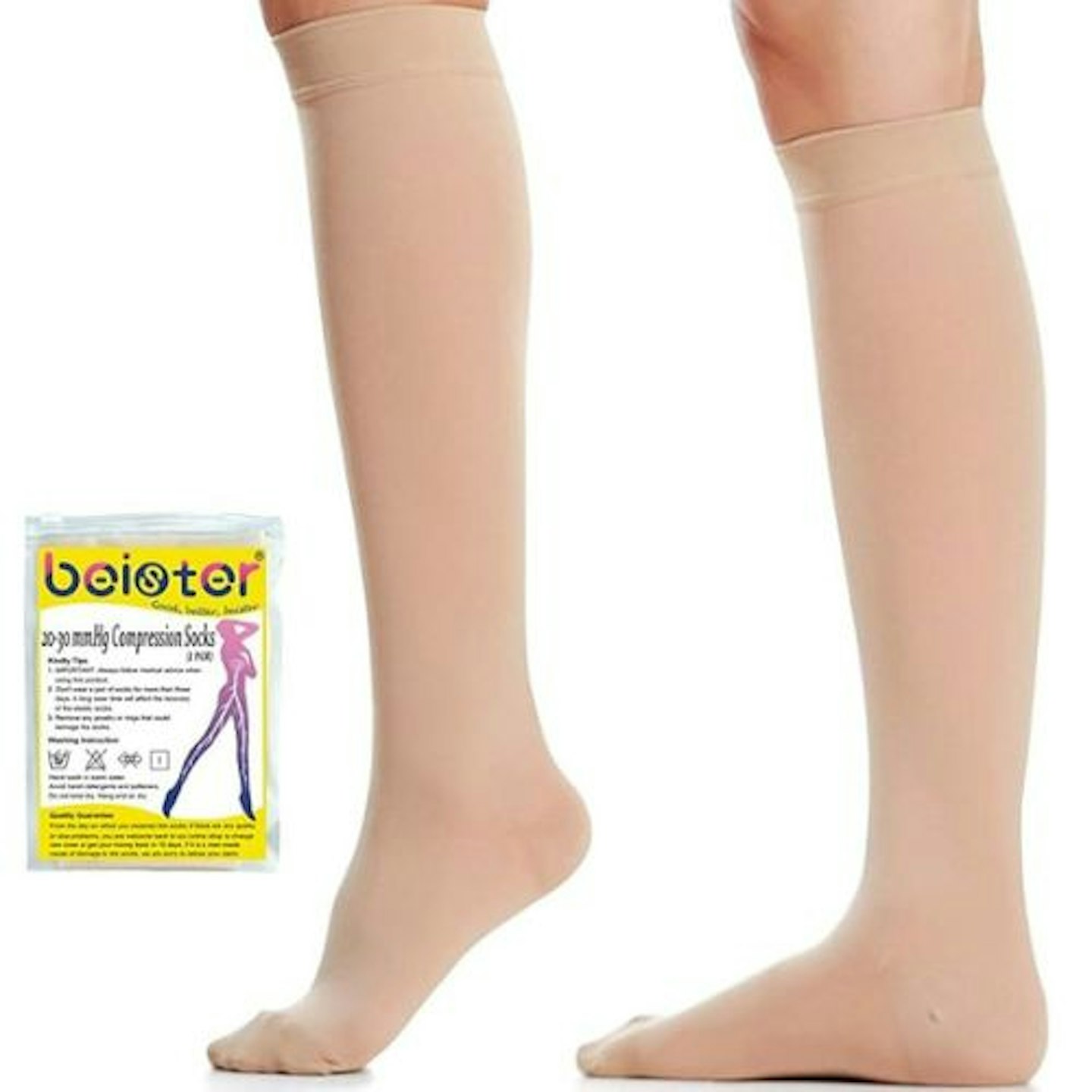 Beister
BeisterBeister Medical Compression Socks come in several XL sizes, so they are a good option for individuals with significant leg swelling. They offer firm 20-30mmHg graduated support that's effective in helping to relieve varicose veins and spider veins. Plus, this compression hosiery is suitable for leg issues caused by diabetes. They can also be used as a DVT preventative measure on long flights.
These compression socks have received mixed reviews. On the one hand, customers say they were good value for money and effective in relieving the pain of varicose veins and oedema. However, other reviews say that they can feel a bit too tight and that the sizing is misleading. Therefore, measuring your legs and comparing them to the manufacturer's sizing chart before buying is essential. Also, these compression socks are more suited to relieving particular medical conditions than general use.
Pros
- Medical-grade compression hosiery that's available in a range of XL sizes
- Toe style is roomy so it's comfortable when your feet spread, plus the cuff is soft
Cons
- Some customer found these compression socks were too restrictive
Best for medical-grade compression
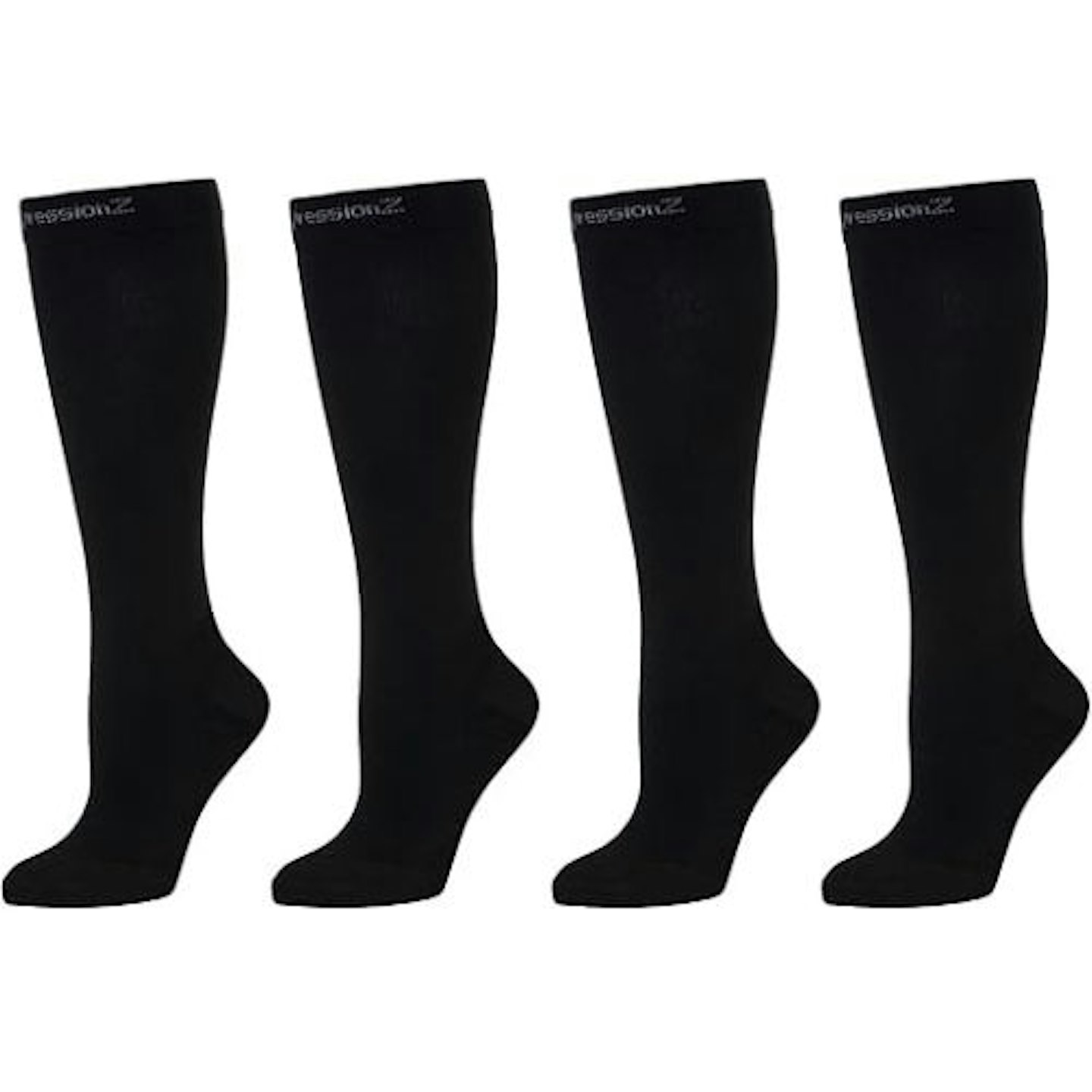 COMPRESSIONZ
COMPRESSIONZWith 30-40mmHg support, COMPRESSIONZ Compression Socks are aimed at individuals suffering from chronic leg conditions. They provide a snug fit yet still give the wearer a full range of motion. They can be used to support healing after a sports injury or relieve the pain of Plantar Fasciitis. The material is thick yet breathable and supports the whole foot and leg.
Customers praise how well-made these socks are. In particular, they point out the reinforced heel and support around the foot, which helps contain oedema around the toes. The socks are thick, durable and stay in place. Several reviews comment that these socks feel better than their medically-issued compression hosiery. Customers bought two sizes to figure out which provided the better fit.
Pros
- Well praised in reviews for supporting feet and legs
- Durable, thick, with a reinforced heel
- Medical-grade compression to aid better circulation
Cons
- A bit of trial-and-error to get the right size
Best compression socks for men
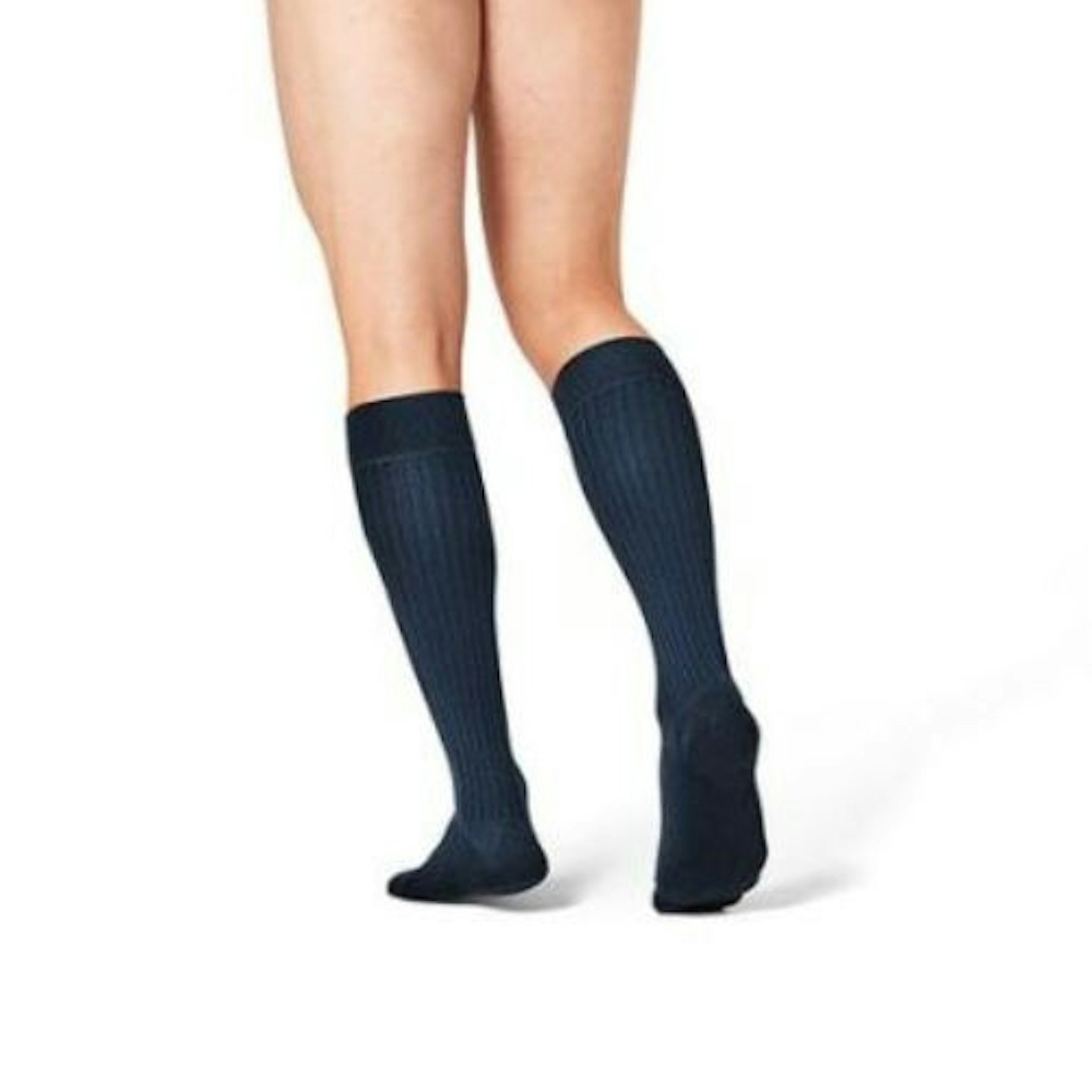 JOBST®
JOBST®www.daylong.co.uk
JOBST® is another Dr. Uys recommended brand. The brand is a leading specialist in medical compression hosiery that has an innovation knitting method to ergonomically fit and defy gravity. If you have a loved one who is suffering with leg fatigue, varicose veins or mild swelling, these Class 1 18-21mmHg compression socks for men could improve their symptoms.
These socks have a premium price-point so it's important to take measurements and follow the comprehensive sizing chart in order to get the best fit.
For more JOBST® products, including unisex compression garments, check out JOBST® on Daylong Direct.
Pros
- Leading brand in medical compression hosiery
- Good range of sizes, fittings and colours
- Premium quality materials that's supportive without looking like compression socks
Cons
- Expensive if you're buying multiple pairs
Best full-leg compression stocking
Juzo® is a GP-recommended brand for medical-grade compression stockings and other associated products. For instances where swelling or varicose veins extend above the knee, these thigh length compression stocking can provide firm Class 2 23-32mmHg compression. This hosiery is effective in relieving symptoms associated with serious leg swelling. In addition, the material is soft microfibre which is suitable to wear over leg ulcers.
Please note, it's essential to consult your GP, nurse or pharmacy before making a purchase, to ensure you are getting the right form of compression hosiery to relieve a particular condition.
Pros
- GP-recommended medical-grade compression hosiery
- Available in a range of sizes, fittings, colours, and styles
Cons
- These are intended for more serious medical conditions, please consult a medical expert before buying
FAQs
What causes varicose veins?
Varicose veins occur when valves in the veins fail, causing blood to pool, which stretches and bulges the veins. This often happens as a result of standing for long periods, as blood accumulates in the legs and the veins have to work harder against gravity. When muscles aren't actively contracting, they don't assist in pushing blood back to the heart. Pooling blood can clot, leading to deep vein thrombosis (DVT). These clots are dangerous as they can travel to the lungs, causing a pulmonary embolism. A compression sock applies pressure to the vein, helping to prevent it from stretching. Additionally, elevating your legs can aid blood flow back towards your heart. You need to see your GP if a varicose vein starts to bleed.
On compression socks what does mmHg mean?
mmHg stands for millimetres of mercury, a unit of pressure measurement. It indicates the compression exerted on your legs. Higher mmHg means stronger compression, which is essential for treating certain medical conditions. Compression socks typically provide graduated compression, such as 15-20mmHg. Based on the NHS guidelines for compression hosiery:
• Class 1 14-17mmHg is light and for daily wear
• Class 2 18-24mmHg for medical recovery and mild varicose veins
• Class 3 25-35mmHg is for severe cases of oedema, blood clots (DVT) and varicose veins
Don't compression socks just cut off the circulation?
Compression socks are designed to improve circulation, not cut it off. They apply graduated pressure, with the highest at the ankle, gradually decreasing up the leg. This helps prevent blood pooling. Getting the right size is crucial. Incorrectly sized compression socks can cause discomfort, restrict circulation or be ineffective. Measure your ankle, calf and sometimes thigh circumference, plus leg length. Then, compare these to the manufacturer's sizing chart. Consult a healthcare professional to ensure you get the correct compression level and fit.
Are compression socks dangerous?
Compression socks are generally safe when used correctly. Still, they can be dangerous if they're too tight, worn too long, or used by individuals with certain conditions like peripheral artery disease (PAD). Always consult a healthcare professional before starting use. It is important to wear the correct size and level of support appropriate to your condition. While it's fine to wear compression socks all day, it's best to take them off at night. Compression socks can cause skin irritation, especially if they are too tight or worn too long, or if the wearer has sensitive, fragile or ulcerated skin.
What length of compression stocking do I need?
The length of compression stockings depends on your specific needs. Knee-high socks are common for lower leg issues – such as swollen ankles and feet – while thigh-high styles are used for more extensive conditions, where swelling or varicose veins extend above the knee. Consult a healthcare professional for guidance. In addition, some compression stockings have open toes, which can be preferable as they allow for better ventilation, accommodate various foot shapes, and make it easier to inspect toes and nails.
What's the best material for compression socks?
Compression socks have high elasticity, usually made from a blend of nylon and polyester. However, they can irritate sensitive skin, so consider cotton or wool alternatives, though they provide lower compression. Also, choose between opaque or sheer hosiery: Opaque fabric offers more support, while sheer stockings are lightweight and stylish but may not support swelling so well.
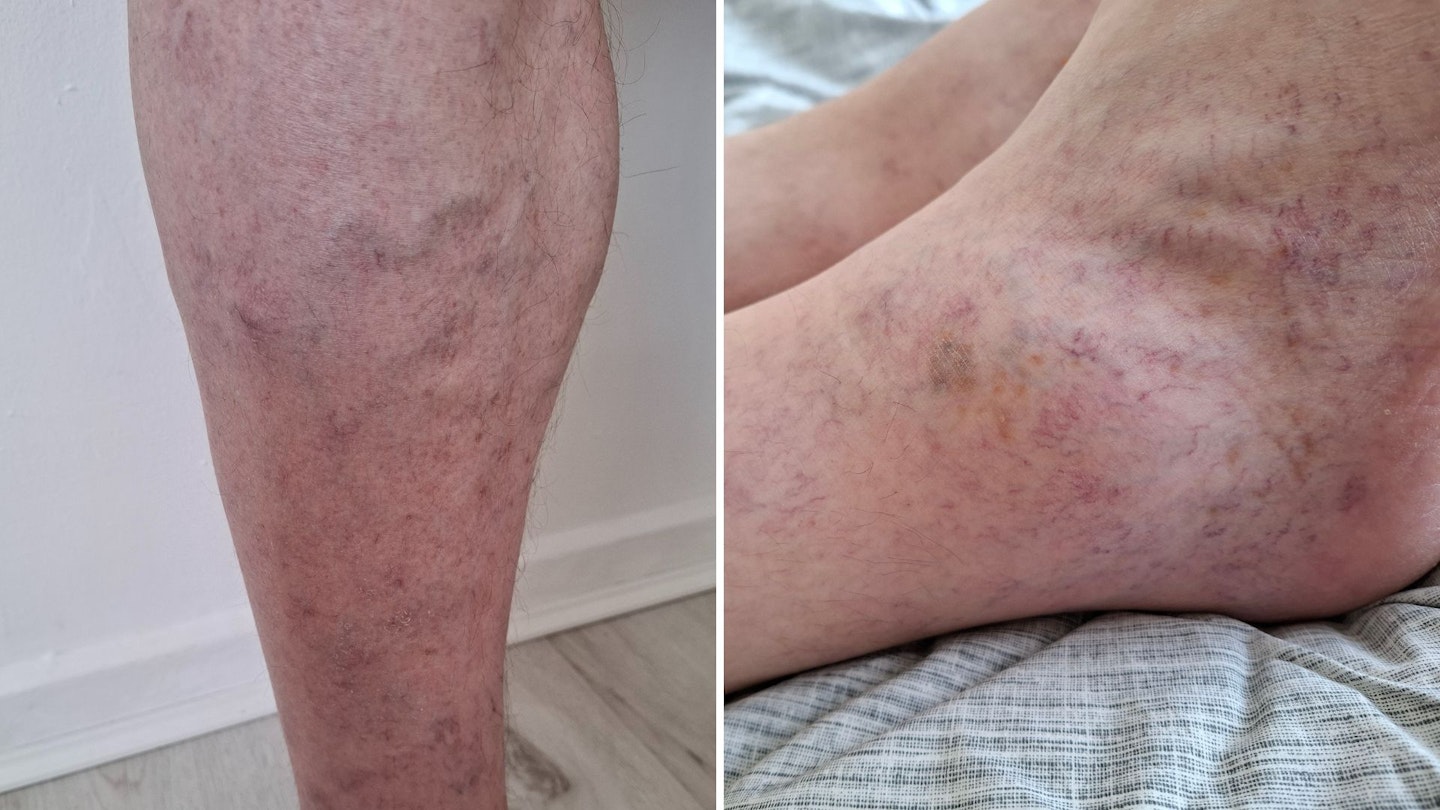
Ask the expert
Veincentre's Dr Mark Bratby debunks some of the myths around the causes of thread veins, commonly known as 'spider veins'. These small, dilated blood vessels visible on the skin's surface. It is often claimed that certain lifestyle factors cause thread veins. But Dr Bratby, Consultant Interventional Radiologist at Veincentre, sets the record straight.
Dr Bratby says: “While there are some lifestyle choices that can amplify the appearance of thread veins, the root cause is in our DNA.
“People will only have vascular issues if they’re genetically predisposed to them, and while some other factors might make them worse, it’s time to stop the misinformation about what causes thread veins.”
Alcohol
Alcohol causing spider veins is a common theory, but Dr Bratby says this is not the case.
“It is a classic old wives’ tale. Yes, many people have blood rush to their cheeks when they’ve had a drink but thread veins will only appear if people are predisposed to them.
“Alcohol could cause veins to expand but it is not the sole cause of the condition.”
Pregnancy and menopause
Women’s bodies change a lot through pregnancy and the menopause. Thread veins and varicose veins have been named one of these changes.
But Dr Bratby says it’s not that straightforward. He explains: “Added weight and hormonal changes might cause thread veins, but only in people who were already likely to get them.
“The same can be said for going through the menopause and other hormonal changes. If someone has weak vein walls then any pressure or dramatic changes to this area can exacerbate this.”
Standing for a long time
Hairdressers, chefs, retail employees and healthcare workers have often been thought of as people more likely to suffer from vein issues, due to being on their feet for most of the day.
“Being on your feet for a long time could cause the veins in your legs to undergo extra pressure, but the dilation in thread veins would not be solely caused by your job,” says Dr Bratby.
Saunas
Experiencing extreme heat, such as in a sauna, can make veins dilate, according to Dr Bratby.
He says: “If you have weak vein walls, a sauna could stretch this further and leave you with thread veins. It would be like inflating a balloon – even when it returns to normal, it’s not the same as it was before.
“But if you don’t have a history of thread or varicose veins in your family, it’s unlikely a trip to a sauna would cause you to have them.”
This article includes expert commentary from Dr Mark Bratby, Consultant Interventional Radiologist at Veincentre. And Dr. Johannes Uys, Doctor at Broadgate GP.
Natalie Knowles is a Homes & Garden Product Writer for Yours, specialising in home appliances. When she's not testing sparkling water makers, she flexes her creative flair as an artist.

